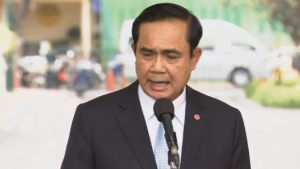
(Reuters) — Thailand‘s Prime Minister Prayuth Chan-ocha said on Monday (February 1) that a general election will take place in 2017, amid criticism that a draft constitution unveiled last week would delay the poll.
A draft constitution released on Friday (January 29) has been pilloried by all major political parties, raising fears it will be rejected in a July referendum, delaying a return to democracy.
“The year 2017, 2017, 2017,” a visibly irritated Prayuth told reporters in response to a question about when an election will be held, as he walked away from a news briefing.
Prayuth also angrily said that the assembled media should ask the Thai people what they want, instead of jumping to conclusions about any upcoming election.
“Have you ever asked the people what they want? You should ask the people, not just ask some people, some groups,” he said.
Last week, Prayuth said Thailand will hold an election in 2017 even if the draft constitution does not pass the referendum.
The draft of Thailand‘s 20th constitution is to replace one scrapped after a 2014 coup by generals who promised stability in Southeast Asia’s second biggest economy and to heal divisions after a decade of turbulence.
Meechai Ruchupan, chairman of the junta-appointed Constitution Drafting Committee, said his team had included clauses aimed at reconciliation but it had failed to come up with easy remedies.
A government roadmap for a mid-2017 election would be delayed by a “minimum of two to three months”, he said.
At the heart of Thailand‘s fractious politics is rivalry between the Bangkok-based royalist-military establishment and populist former Prime Minister Thaksin Shinawatra and his allies.
The military government has curbed dissent and pushed back the timetable for elections, raising concern about the prospects of a country that was for years hailed as an example of a successfully developing Asian economy.







